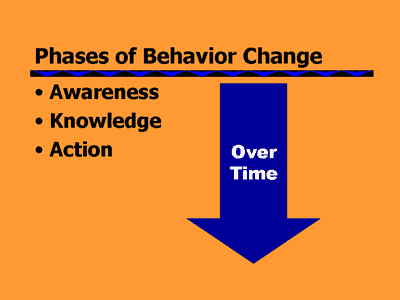Why outreach?
Many state and federal agencies require some form of outreach or public education and involvement as part of their water quality laws and regulations. For example, Phase II of EPA's National Pollutant Discharge Elimination System (NPDES) stormwater regulations require communities to perform public outreach and involve the public in the development of their stormwater management programs. Some states, like Maine, take these requirements a step further by mandating that outreach efforts "must aim at raising awareness and ultimately at changing behaviors." Developing an effective outreach campaign not only will help gain the critical support and compliance that will lead to the ultimate success of the stormwater management program, but also will help meet federal and state water quality requirements. Likewise, the success of your program also hinges on making audiences aware of the issues, educating them on what needs to be done, and motivating them to take action and change their behaviors.
How can outreach help change behavior?
Changing behavior through education and developing responsible attitudes among watershed citizens and communities is not a simple task, but experience has demonstrated that it can be done. Think of times when you've changed your own attitude or behavior, perhaps when you finally realized that it really isn't so hard to separate the recyclables from the trash or decided to get serious about a diet or exercise program. A few things happened before the behavior change took place. First, you received information on the ramifications of your current behavior-specific data on the problem. Then you linked your actions to something you cared about—your health or your pocketbook, for instance. Finally, you decided to do something about it.
That's the approach needed to address polluted runoff. Although it's important to let people know about the water quality problems the professionals have found, often simply informing and educating people on the issues is not enough to initiate behavior change. Using the basic steps outlined in this module will help ensure that your outreach program promotes real behavior change. Keep in mind that behavior change occurs in phases over time. First, audiences need to be made aware, for example, that they live in a watershed, then they will need to be educated on the problems facing the watershed, and finally they need to know what actions they can take to help address those problems.
![[logo] US EPA](https://www.epa.gov/epafiles/images/logo_epaseal.gif)
